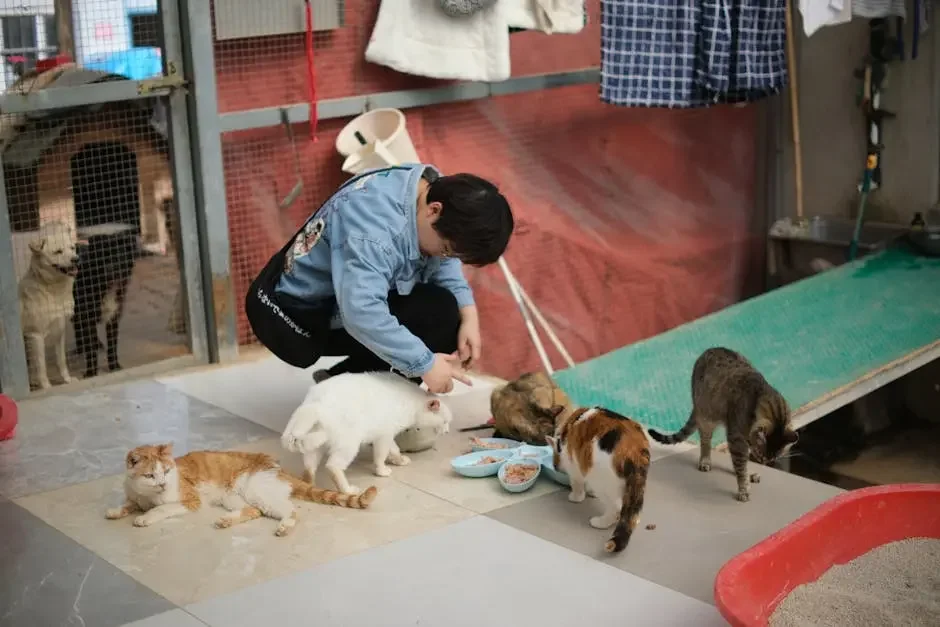8 Common Myths About Kitten Adoption Debunked
Adopting a kitten is one of the most rewarding experiences a pet lover can have. However, misconceptions can make potential adopters hesitant. Let's clear the air and debunk some common myths that may be holding you back from welcoming a furry friend into your home.
1. Kittens Are Easy to Care For
While kittens may seem adorable and carefree, they require significant attention and care to thrive. This includes proper nutrition, socialization, and training.
It's easy to fall for the cute little faces and playful antics, but the responsibility that comes with kitten ownership should not be underestimated. Kittens need to be socialized properly to develop into well-adjusted cats. This means exposing them to a variety of experiences, sounds, and people. Additionally, they require regular vet visits, vaccinations, and, of course, a balanced diet to support their growth.
2. All Kittens Are Hyperactive
Not every kitten is a bundle of energy. Different breeds and individual personalities can lead to a range of activity levels, including those that enjoy quiet time.
For instance, some breeds are known for their calm demeanor, such as the British Shorthair or the Ragdoll. These kittens can often be found napping in cozy spots rather than zooming around the house. It’s important to recognize that energy levels vary greatly! Keep in mind that with every kitten, there’s a unique personality. Understanding this can help you find a kitten that matches your own lifestyle.
3. You Can't Find Purebred Kittens in Shelters
Many shelters and rescues have purebred kittens available. You might be surprised at the variety of breeds looking for a home!
It's a common misconception that only mixed-breed kittens populate shelters. In reality, many purebred kittens end up there due to owners who can no longer care for them. By checking local rescues or breed-specific shelters, you could very well find that perfect purebred companion. Plus, adopting from a shelter not only saves a life but often comes at a fraction of the cost of buying from a breeder.
4. Kittens Need to Be Adopted in Pairs
While adopting kittens in pairs can be beneficial, many thrive as solo companions. It depends on the kitten's personality and your lifestyle.
It's true that two kittens can keep each other entertained and help socialize each other. However, many single kittens can develop deep bonds with their human parents instead. The key is to observe your kitten’s preferences. Some may enjoy the company of another cat, while others can be perfectly happy exploring alone. Whether you choose to adopt one or two, what matters is ensuring your new friend feels loved and secure.
5. Adopting a Kitten Is Too Expensive
Adoption fees often cover necessary vaccinations and spaying or neutering. In many cases, this is a cost-effective option compared to purchasing kittens from breeders.
When you factor in the costs associated with owning a pet, adoption fees start to look like quite a bargain. These fees typically cover initial medical care, so you won't have to worry about those early vet visits. Plus, shelters often provide discounts for first-time pet owners and sometimes even include starter kits with supplies. This makes adopting a kitten not just a humane choice but also a financially savvy one!
6. Kittens Will Automatically Get Along with Other Pets
Introducing a new kitten to existing pets requires careful planning and patience. It’s essential to facilitate a gradual introduction to ensure harmony.
While some kittens may be naturally sociable, others can be shy or territorial when encountering new companions. Spend time in the initial introduction phases to ease the tension. Consider creating a safe space specifically for the new kitten, letting them sniff each other through a door or a baby gate before any direct interactions. This process may take time, but with gentle introductions, many kittens can learn to coexist happily with older pets.
7. All Kittens Are Litter Trained
While many kittens pick up litter training quickly, some may require guidance and time. Be prepared to invest some effort into the training process.
Though most kittens instinctively know how to use a litter box, they often need a little encouragement. It’s vital to place them in the box frequently and reward them when they use it correctly. If your kitten has trouble, consider the type of litter and box being used, as every kitten has different preferences. With time and patience, most kittens will get the hang of it. This isn’t just about cleanliness; it’s about forming a solid bond built on trust and understanding.
8. Older Cats Are Better Pets than Kittens
Kittens offer a unique set of joys and challenges, and those who adopt them often create lasting bonds. Each age has its perks, so it’s crucial to choose based on your lifestyle and preferences.
It's easy to romanticize about the mellow nature of older cats, but kittens bring a whole new level of energy and love! They often adapt well to new environments and learn quickly with the right encouragement. Adopting a kitten means embracing the journey of training and nurturing, which can be incredibly rewarding. At the end of the day, whether you choose a kitten or an older cat, what truly matters is the love and companionship that will blossom in your home.

